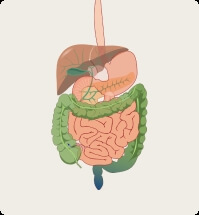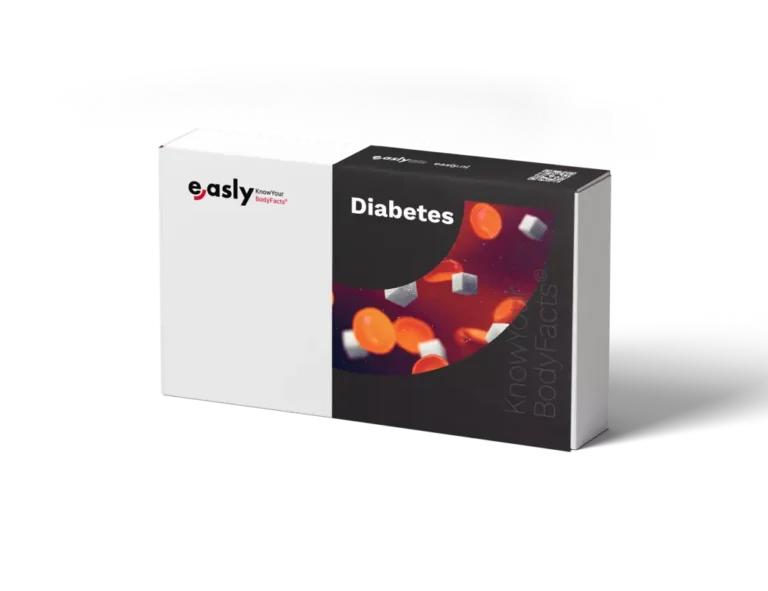Digestive problems affect millions of people worldwide, draining energy, clouding focus, and disrupting daily life. In Europe alone, over 332 million people face these challenges, often unaware that their gut is the root cause. Many blame stress, lack of sleep, or aging, delaying action until minor symptoms worsen into chronic problems


Understanding the digestive problems symptoms is vital for safeguarding your health. Identifying symptoms early can stop these issues from escalating and help you maintain your well-being. This guide will help you recognize key warning signs and provide practical steps to restore balance and improve your health.
Let’s get started.
What is digestion?
Digestion is the process through which your body breaks down food into essential nutrients for energy, growth, and repair. It all begins in the mouth, where chewing breaks food into smaller pieces while saliva enzymes like amylase start breaking down carbohydrates. The food then travels down the esophagus, a muscular tube that delivers it to the stomach.
In the stomach, gastric acid and enzymes such as pepsin continue breaking down proteins into smaller, usable components. The journey progresses to the small intestine, where most nutrient absorption occurs. Here, bile from the liver emulsifies fats, and pancreatic enzymes like lipase and amylase further digest fats, carbohydrates, and proteins. Nutrients are absorbed through the intestinal walls into the bloodstream, providing the body with the fuel it needs.


Finally, the large intestine reabsorbs water and compacts any remaining material into waste, ready for elimination. Each organ plays a vital role in this seamless process, ensuring your body gets the nutrients it needs to function optimally.
Symptoms of poor digestion: how Do Yyu know something is wrong?
Poor digestion can reveal itself through various symptoms, some subtle and others hard to miss. Here’s how to recognize digestion problems symptoms:
- Bloating: This is a feeling of fullness or swelling in the abdomen, often caused by trapped gas or fluid retention. It can leave you uncomfortable and heavy.
- Diarrhea: It’s loose or watery stools. They are a clear sign that food is moving too quickly through your digestive tract. And exactly how fast does food digest with diarrhea? Well, it’s often much faster than normal, which prevents proper nutrient absorption.
- Constipation: Involves difficulty passing stools which often signals a slowdown in your digestive system, commonly linked to low fiber intake or dehydration.
- Heartburn: It’s a burning pain in the chest caused by stomach acid rising into the esophagus. This discomfort can feel intense and persistent.




- Nausea and vomiting: These are indicators that your stomach is struggling to process food properly, often pointing to an underlying issue.
- Fatigue: Feeling low energy because of poor nutrient absorption. You are mostly tired, even after adequate rest.
- Unexplained weight loss: You may lose weight without trying, signaling serious digestion problems, such as malabsorption or chronic conditions like Crohn’s disease.
What causes diestive problems?
Several factors can disrupt the delicate balance of your digestive system. Here’s a deeper look at the common causes and their impact:
- Diet: A diet high in fats, low in fiber, or filled with processed foods can strain your digestive system. High-fat meals slow stomach emptying, leading to bloating, while insufficient fiber contributes to constipation by reducing stool bulk and slowing intestinal transit. Processed foods can also contribute to poor intestinal flora symptoms, as they affect the diversity and balance of gut bacteria.
- Stress: Chronic psychological stress affects the gut-brain axis, leading to changes in gut motility and acid production. Stress can exacerbate conditions like IBS, cause heartburn, or even alter the gut microbiome, making digestion less efficient.
- Dehydration: Water is essential for digestion, from breaking down food in the stomach to moving waste through the intestines. Dehydration can harden stools, making them difficult to pass, and slow overall digestive processes.
- Food intolerances: Inability to digest specific components like lactose (due to lactase deficiency) or gluten (in celiac disease) triggers symptoms like bloating, diarrhea, and abdominal pain. These intolerances often lead to chronic inflammation or nutrient malabsorption if untreated.


- Medications: Certain drugs can disrupt normal digestive function. Antibiotics, for instance, disturb gut microbiota balance, while NSAIDs (non-steroidal anti-inflammatory drugs) can irritate the stomach lining, leading to ulcers or acid reflux.
- Underlying Conditions: Chronic illnesses such as diabetes and hypothyroidism can slow digestion, causing issues like gastroparesis or constipation. Autoimmune diseases like Crohn’s or ulcerative colitis result in inflammation that directly damages the digestive tract.
Common digestive problems and diseases.
Digestive conditions vary widely in severity and impact. Some are manageable with lifestyle changes, while others require medical intervention. Here’s an overview of the most common issues:
- Gallstones: Hardened deposits that form in the gallbladder can block bile flow, causing severe abdominal pain, nausea, and even infections. They often result from diets high in cholesterol or low in fiber.
- Celiac Disease: An autoimmune disorder triggered by gluten consumption, this condition damages the small intestine’s lining, leading to malabsorption, diarrhea, bloating, and fatigue. Untreated, it can cause long-term complications like osteoporosis or anemia.
- Crohn’s Disease: A chronic inflammatory condition affecting any part of the gastrointestinal tract, Crohn’s causes symptoms such as abdominal pain, diarrhea, fatigue, and weight loss. Its severity varies but often requires ongoing management.



- Ulcerative Colitis: Similar to Crohn’s but confined to the colon and rectum, ulcerative colitis results in inflammation and ulcers, leading to bloody diarrhea, abdominal pain, and urgent bowel movements. It carries an increased risk of colon cancer if not controlled.
- Irritable Bowel Syndrome (IBS): A functional disorder with symptoms like cramping, bloating, and irregular bowel habits (diarrhea, constipation, or both). While not life-threatening, IBS significantly impacts quality of life and often requires dietary and stress-management strategies.
- Hemorrhoids: Swollen veins in the rectum or anus can cause itching, pain, and rectal bleeding. They often develop from straining during bowel movements or prolonged sitting, especially with chronic constipation.
- Diverticulitis: Inflammation or infection of small pouches (diverticula) in the colon causes sharp abdominal pain, fever, and changes in bowel habits. It’s often linked to a low-fiber diet and can lead to serious complications like abscesses or perforations if untreated.


What you should know about poor digestion
If food does not digest well and the causes are not addressed, this can have far-reaching consequences. Here are some critical outcomes to consider:
- Malnutrition: Poor nutrient absorption deprives your body of essential vitamins and minerals, leading to symptoms like brittle hair, weakened immunity, and chronic fatigue. Left unchecked, malnutrition can result in severe complications such as anemia and osteoporosis.
- Chronic Discomfort: Persistent bloating, abdominal pain, and fatigue don’t just lower your quality of life; they can also cause emotional distress and social withdrawal. Chronic discomfort often becomes a vicious cycle, exacerbating stress and worsening symptoms.
- Increased Disease Risk: Long-term neglect of digestive health can escalate into serious conditions such as peptic ulcers, gastrointestinal infections, or even colorectal cancer. The progression is often gradual, making early detection and treatment vital.


Tests for poor digestion
Diagnosing the root cause of a digestion problem often requires a combination of medical tests, each tailored to uncover specific issues:
- Blood Tests: These tests assess nutrient deficiencies (like iron or vitamin B12), detect inflammatory markers (e.g., C-reactive protein), and identify infections. They provide a broad overview of your body’s response to digestive issues.
- Stool Analysis: Stool tests can reveal the presence of harmful bacteria, parasites, or signs of inflammation, such as calprotectin levels. They’re also used to detect fat malabsorption, which may indicate pancreatic insufficiency.
- Endoscopy/Colonoscopy: Endoscopy allows doctors to examine the upper digestive tract (esophagus, stomach, and small intestine), while colonoscopy focuses on the colon and rectum. These procedures help identify ulcers, polyps, strictures, and other structural abnormalities.

- Breath Tests: Used to diagnose lactose intolerance and small intestinal bacterial overgrowth (SIBO), breath tests measure hydrogen or methane levels in your exhaled air after consuming specific sugars. Elevated levels indicate improper digestion or bacterial imbalances.
- Imaging Tests: Techniques like CT scans, MRI, or ultrasound are sometimes used to detect structural issues, such as blockages, tumors, or organ inflammation.
- Specialized Tests: In certain cases, tests like gastric emptying studies or pH monitoring may be conducted to evaluate how well your stomach empties food or to measure acid reflux severity.
Additionally, a microbiome test can provide valuable insights into the balance of gut bacteria, helping to identify potential causes of digestive issues such as bloating or discomfort.



These tests, when combined with a detailed medical history and physical examination, allow healthcare providers to pinpoint the cause of digestive problems and recommend the most effective treatment plan. If you’re experiencing persistent symptoms, consulting a specialist is crucial to ensure a thorough and accurate diagnosis.
What happens when food doesn’t digest well?
When food is not digested, it can linger in the gut, leading to a cascade of issues:
- Gas and Bloating: Undigested food can ferment in the gut, producing excess gas and causing uncomfortable bloating. This fermentation process often indicates imbalances in the gut microbiome.
- Disruption of Nutrient Absorption: When food digests poorly it means essential nutrients aren’t absorbed efficiently, potentially leading to deficiencies that affect energy levels, immunity, and overall health.
- Altered Gut Microbiome: When food isn’t properly broken down, it can feed harmful bacteria in the gut, disrupting the balance of the microbiome. This imbalance increases the risk of infections, inflammation, and conditions like small intestinal bacterial overgrowth (SIBO).
- Inflammation and Irritation: Undigested particles can irritate the gut lining, contributing to inflammation. Chronic irritation may lead to leaky gut syndrome, where the intestinal barrier becomes more permeable, allowing toxins and bacteria to enter the bloodstream.
How to restore gut balance
Restoring gut health is essential for overall well-being and can often be achieved through targeted lifestyle changes and interventions. Here are the most effective strategies:
- Dietary Adjustments: Start by incorporating fiber-rich foods like fruits, vegetables, whole grains, and legumes. Fiber promotes healthy bowel movements and supports beneficial gut bacteria. Additionally, include probiotic-rich foods such as yogurt, kefir, kimchi, and sauerkraut to boost microbiome diversity. Avoid processed foods, excessive sugar, and unhealthy fats, which can disrupt gut balance.
- Adequate Hydration: Water plays a critical role in digestion by breaking down food and aiding nutrient absorption. Aim for at least 8 glasses (about 2 liters) of water daily but adjust based on activity level and climate. Proper hydration helps prevent constipation and ensures smooth movement of food through the digestive tract.




- Stress Management: Chronic stress negatively impacts the gut-brain axis, leading to disrupted digestion and microbiome imbalances. Practice mindfulness, deep breathing, or yoga to reduce stress levels. Regular physical activity can also alleviate stress while promoting gut motility.
- Incorporate Prebiotics and Probiotics: Prebiotics (found in foods like garlic, onions, and bananas) nourish beneficial gut bacteria, while probiotics replenish and balance microbiome populations. Together, they enhance gut health and digestion. The most effective approach, however, is a personalized prebiotic and probiotic prescription tailored to your unique needs. These are designed based on the specific makeup of your gut flora, which can be analyzed through a microbiome test. This ensures that you’re only taking supplements that are relevant to your unique microbiome, avoiding generic options that may not address your specific gut health needs.
- Seek Professional Guidance: If symptoms persist or worsen, consult healthcare professionals such as a gastroenterologist or registered dietitian. Persistent gut issues may indicate conditions like SIBO, IBS, or food intolerances that require specialized treatment.
Conclusion
Digestive health is essential for feeling your best. Ignoring the signs can lead to bigger problems, but acting early can help you stay healthy. Easly makes it easier to understand your digestive needs with simple tools and personalized support. You can find the right solutions and track your progress effortlessly. Don’t let discomfort take over—take charge of your health and feel better with Easly by your side.
Sources:
- National Library of Medicine — The Gut Microbiome and Its Role in Obesity
- Sciencedirect — The links between gut microbiota and obesity and obesity related diseases
- Yale School of Medicine — Treating Obesity with Gut Microbiota
- Emory University — Scientists identify obesity-promoting metabolite from intestinal bacteria











